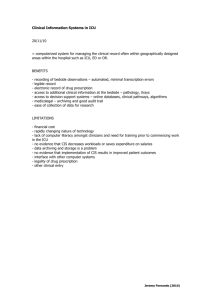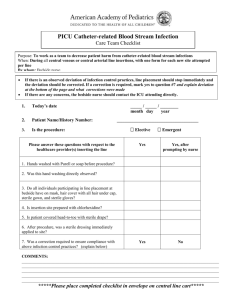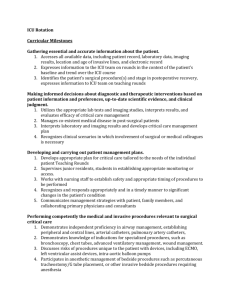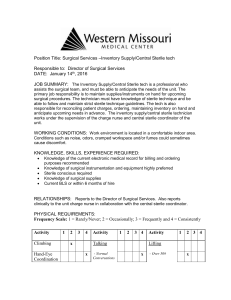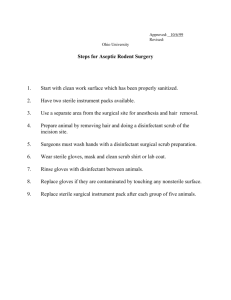Bedside Surgery Protocol Trauma / Emergency General Surgery
advertisement
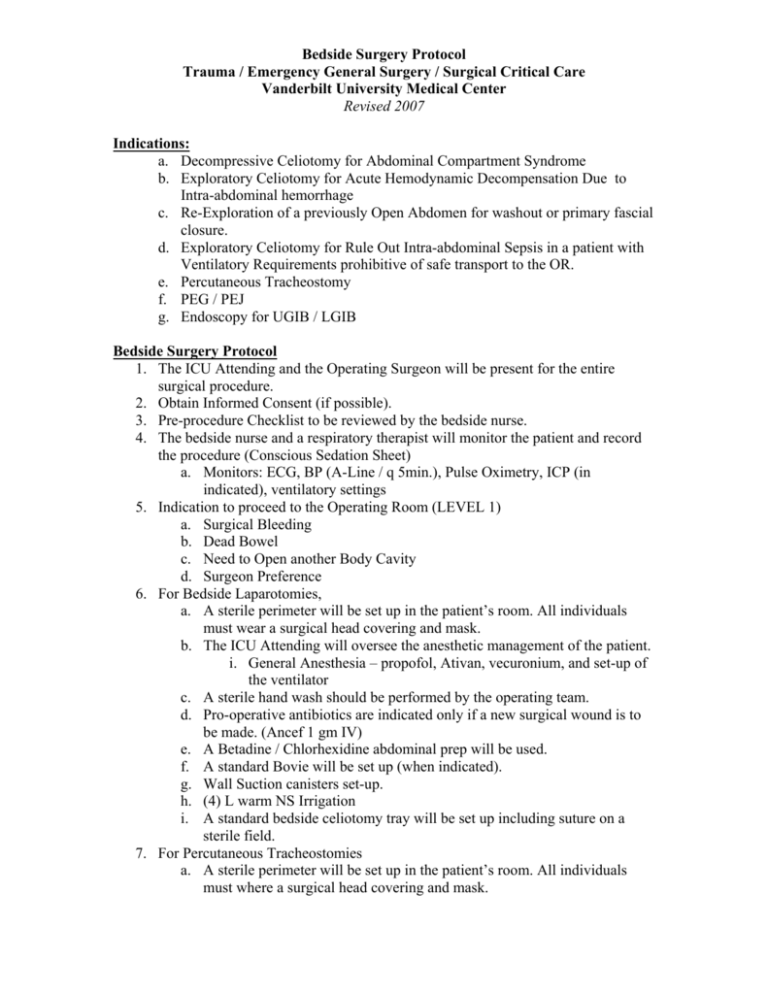
Bedside Surgery Protocol Trauma / Emergency General Surgery / Surgical Critical Care Vanderbilt University Medical Center Revised 2007 Indications: a. Decompressive Celiotomy for Abdominal Compartment Syndrome b. Exploratory Celiotomy for Acute Hemodynamic Decompensation Due to Intra-abdominal hemorrhage c. Re-Exploration of a previously Open Abdomen for washout or primary fascial closure. d. Exploratory Celiotomy for Rule Out Intra-abdominal Sepsis in a patient with Ventilatory Requirements prohibitive of safe transport to the OR. e. Percutaneous Tracheostomy f. PEG / PEJ g. Endoscopy for UGIB / LGIB Bedside Surgery Protocol 1. The ICU Attending and the Operating Surgeon will be present for the entire surgical procedure. 2. Obtain Informed Consent (if possible). 3. Pre-procedure Checklist to be reviewed by the bedside nurse. 4. The bedside nurse and a respiratory therapist will monitor the patient and record the procedure (Conscious Sedation Sheet) a. Monitors: ECG, BP (A-Line / q 5min.), Pulse Oximetry, ICP (in indicated), ventilatory settings 5. Indication to proceed to the Operating Room (LEVEL 1) a. Surgical Bleeding b. Dead Bowel c. Need to Open another Body Cavity d. Surgeon Preference 6. For Bedside Laparotomies, a. A sterile perimeter will be set up in the patient’s room. All individuals must wear a surgical head covering and mask. b. The ICU Attending will oversee the anesthetic management of the patient. i. General Anesthesia – propofol, Ativan, vecuronium, and set-up of the ventilator c. A sterile hand wash should be performed by the operating team. d. Pro-operative antibiotics are indicated only if a new surgical wound is to be made. (Ancef 1 gm IV) e. A Betadine / Chlorhexidine abdominal prep will be used. f. A standard Bovie will be set up (when indicated). g. Wall Suction canisters set-up. h. (4) L warm NS Irrigation i. A standard bedside celiotomy tray will be set up including suture on a sterile field. 7. For Percutaneous Tracheostomies a. A sterile perimeter will be set up in the patient’s room. All individuals must where a surgical head covering and mask. Bedside Surgery Protocol Trauma / Emergency General Surgery / Surgical Critical Care Vanderbilt University Medical Center Revised 2007 b. The ICU Attending will oversee the anesthetic management of the patient. i. General Anesthesia – propofol, Ativan, vecuronium, and set-up of the ventilator c. A sterile hand wash should be performed by the operating team d. High Risk Patient for Percutaneous tracheostomy should be monitored with intra-operative bronchoscopy. e. Rhino Perc Trach Kit, Cut-Down instrument set, suture (2-0 silk), tracheostomy soft pack, 8 Shiley trach, intubation tray, end tidal CO2 monitor. f. Chlorhexidine skin prep g. Post-procedure chest x-ray 8. For Bedside GI Endoscopy a. The ICU Attending will oversee the anesthetic management of the patient. i. General Anesthesia – propofol, Ativan, vecuronium, and set-up of the ventilator b. Video gastroscope system c. Bard PEG / PEJ / Naso-enteric feeding tube kit d. T-fasteners are to be used when placing transgastric jejunal feeding tube. e. T-fasteners are to be cut at day 10. f. Cut-Down Instrument Set and Suture (2-0 silk). g. A notation is made where the g-tube exits the skin in the procedure not and nurse note.
